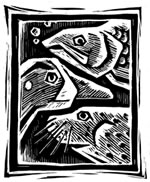- Home
- Restoration Projects
- Project Search
- Immunological Expressions of PAH Exposure in Fish 17170115
Project Information
Title: Immunological Expressions of PAH Exposure in Fish 17170115
Project Year and Number: 2017: 17170115
Other Fiscal Years and Numbers for this Project: 2021: 21170115, 2020: 20170115, 2019: 19170115, 2018: 18170115
Principal Investigator (PI): Andrew Whitehead (University of California Davis)
Managing Agency: NOAA
Assisting Personnel: None
Project Website: https://pwssc.org/exposure-to-oil-limits-herring-fitness/
Research Location: Prince William Sound
Restoration Category: Research
Injured Resources Addressed: Pacific Herring
Abstract:The causes of the collapse of the Prince William Sound (PWS) Pacific herring stock are controversial, and the reasons for the lack of recovery remain a mystery. In the research proposed here we interrogate the genome structure and genome function of PWS fish to test hypotheses about the causes and consequences of the collapse, by revealing ecological, evolutionary, and genetic mechanisms governing the demographic trajectory of PWS fish over the past ~30 years. Conspicuous events that coincided with the dramatic PWS collapse include the Exxon Valdez oil spill (EVOS) four years previous, and the emergence of disease. We test hypotheses concerning the effects of oil exposure, the effects of disease challenge, and the potential interactive effects of oil exposure and disease challenge, on herring health and fitness. Since oil is exquisitely toxic to developing fish embryos at concentrations that were experienced in PWS following the EVOS, we predict that this exposure presented a significant selective event with the side effect of impaired immune function (as evidenced by our recent studies in killifish) leaving fish susceptible to disease and subsequent decline. Alternatively, the oil spill may not have been a significant selective force, but genetic attributes of the PWS stock may have made them susceptible to disease outbreak. In either scenario (and others), we predict that the collapse resulted in significant erosion of genetic diversity in PWS fish, perhaps particularly in immune system genes, which may be limiting their recovery. We will test these predictions and hypotheses by reconstructing genome-wide genetic change through time (pre-EVOS and pre-collapse, post-EVOS soon after collapse, post-EVOS 10 years post-collapse and contemporary) in PWS fish, and compare this to population genetic change through time in a reference site population. Furthermore, a series of laboratory-based experiments will test for population differences in their response to oil exposure in early life and subsequent resilience to pathogen exposures. Physiological measurements and patterns of genome-wide gene expression will serve to reveal similarities and differences in mechanisms of response to these stressors between PWS and reference population fish. These studies should provide novel insights into the causes and consequences of recent dramatic demographic changes in PWS fish, potentially inform novel intervention strategies, and provide modern genomic resources for management and conservation of Pacific herring.
Proposal: View (608 KB)
Reports:
Annual Report FY17: View (226 KB)
Final Report: See Project 21170115
Publications from this Project: None Available
